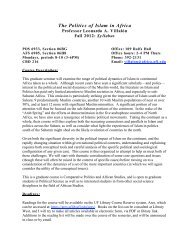Globalization and Diplomacy: A Practitioner's Perspective
Globalization and Diplomacy: A Practitioner's Perspective
Globalization and Diplomacy: A Practitioner's Perspective
You also want an ePaper? Increase the reach of your titles
YUMPU automatically turns print PDFs into web optimized ePapers that Google loves.
Talbott<br />
insisted were necessary to meet the dem<strong>and</strong>s of the global economy. The<br />
unexpected victory of the Socialist Party in last spring's French legislative<br />
elections stemmed in part from voters' apprehensions about globalization.<br />
In the United States, political figures such as Ross Perot <strong>and</strong> Pat<br />
Buchanan have tapped into similar anxieties.<br />
Not all those who are within reach of television consider themselves<br />
better off as a result-in fact, often quite the contrary. There are satellite<br />
dishes in the slums of the world's megacities, <strong>and</strong> the signals they suck in<br />
from Hollywood <strong>and</strong> Madison Avenue can trigger resentment <strong>and</strong> anger:<br />
The communications revolution has<br />
the potential to foment revolutions of<br />
a different sort.<br />
<strong>Globalization</strong> itself is neither inherently<br />
good nor bad. Governments can- meant<br />
not block its effects on their citizens greater<br />
without also cutting them off from its <strong>and</strong>prosperity.<br />
opportunities <strong>and</strong> benefits. But they<br />
can shape it to their national <strong>and</strong> international<br />
advantage.<br />
While this task is an increasingly<br />
important <strong>and</strong> explicit theme in U.S.<br />
diplomacy in the post-Cold War era,<br />
it is not new. In the economic realm,<br />
it goes back at least to the immediate aftermath of World War II <strong>and</strong> the<br />
creation of the World Bank <strong>and</strong> the International Monetary Fund at<br />
Bretton Woods. Three decades later, in 1975, the leaders of France, Italy,<br />
Japan, the United Kingdom, the United States, <strong>and</strong> West Germany took<br />
another step forward together. They met in the picturesque French farming<br />
town of Rambouillet to discuss how they could increase trade, coordinate<br />
monetary policies, <strong>and</strong> reduce their vulnerability to rising oil<br />
prices. This was the first of what became, with the addition of Canada<br />
the following year in London, the annual summit of the Group of Seven<br />
major industrialized democracies.<br />
When the successors of those leaders met for the 22nd time in Denver<br />
last June, they were joined by Boris Yeltsin-the first time that the<br />
president of the Russian Federation participated in the summit from<br />
beginning to end. Just as the cast of characters at Denver had grown<br />
since Rambouillet, so had the agenda. Transnational threats such as climate<br />
change, the spread of infectious disease, <strong>and</strong> international orga-<br />
For many millions of<br />
people, globalization has<br />
freedom<br />
But for<br />
millions of others, the<br />
same process has brought<br />
economic disadvantage<br />
<strong>and</strong> social disruption.<br />
FALL 1997 71








